
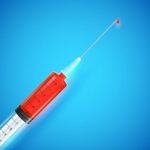 PRP or platelet rich plasma injections for knee arthritis are very popular these days. Many physician are administering PRP injections to patients with osteoarthritis and many other disorders. There has been a lot of controversy about PRP injections — but one of the more recent studies show that PRP injections might slow the progression of your knee arthritis.
PRP or platelet rich plasma injections for knee arthritis are very popular these days. Many physician are administering PRP injections to patients with osteoarthritis and many other disorders. There has been a lot of controversy about PRP injections — but one of the more recent studies show that PRP injections might slow the progression of your knee arthritis.
Many questions (should) arise when the topic of PRP injections for arthritis of the knee is discussed in the office.
- Can PRP injections alleviate the pain of arthritis?
- Can PRP improve your quality of life?
- Can PRP slow the progression of your arthritis?
PRP or platelet rich plasma is a treatment that can be offered to patients with osteoarthritis, and many tendon disorders such as tendinosis. This office based procedure involves taking a sample of blood from you and preparing it in a centrifuge. We then take a certain portion of your blood out of the tube and inject it back into your knee, elbow, or whatever structure we are treating. The sample now contains your platelets which are cells in your blood that contain a lot of inflammatory and healing chemicals. Once the platelets are injected back into you, they will release these chemicals which stimulate other cells to come to the area of injury or pain. Those recruited cells and the chemicals released by the platelets can diminish inflammation, and in some situations lead to healing.
The research surrounding the use of PRP injections is significant, and yet, at this point still in its infancy. Some studies show significant improvement, while some show little improvement over a placebo. The issues with the research is that a placebo itself can result in relief, and not all PRP preparations are the same. Different manufacturers also prepare the PRP in different ways — so we may not be comparing apples to apples.
Can PRP Prevent Arthritis from Worsening?
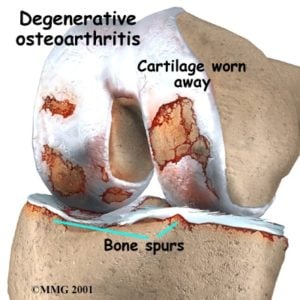
A recent study performed in 2013 set out to see if PRP might actually slow the progression or worsening of osteoarthritis. Osteoarthritis involves the loss of cartilage in your knee. Previous studies have shown that the average arthritic knee can lose up to 5% of its cartilage ( or cushioning) every year. In the study quoted above, they found that 1 year after a PRP injection for arthritis of the knee, there was no further cartilage loss in more than 70% of knees.
“We are entering into an era of biologic treatment, which is incredibly ideal, where you can use your own cells to try to help repair your other cells, rather than using a substance that is artificial,” Dr. Brian Halpern
Bottom Line: The take home message is that PRP injections might slow the progression of osteoarthritis. PRP injections might preserve the cartilage that you have left within your knee. PRP injections appear to improve your quality of life and may enable you to put off further consideration of surgery as an alternative treatment. BUT, PRP injections have NOT been shown to reverse or cure the arthritis, yet. Many, many more research studies are needed. Stay tuned …
Do you have questions regarding an Orthopedic injury or longevity?
Do you want to talk to an expert who can listen to you for 45-60 minutes and explain the options in detail?
Dr. Howard Luks offers remote guidance sessions to review your X-ray or MRI images and explain your options.
Dr. Luks has also received hundreds of requests for educational sessions on the topics discussed in his book, Longevity Simplified.

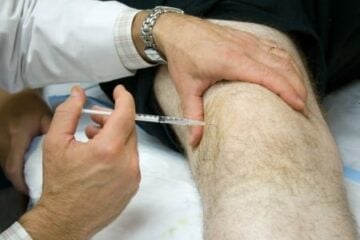

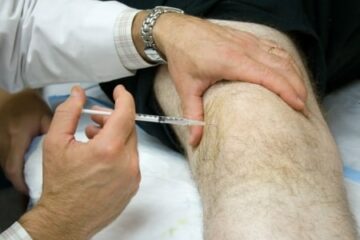
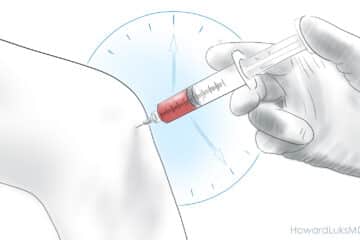








Ann
Thank you Dr. Luks, how do I find out if I’m a candidate for PRP.
Ann
Dr Luks I am very interested I. This treatment for my arthritic knee, I’ve tried therapy and acupuncture as well as a lidocaine injection but not much help. Is this procedure covered by insurance
Sorry Ann… it is not.
ovi
In 2010 ,found out about PRP shots attending a Princeton U coaches clinic.The dr.. told me that based on my history injuries/surgeries will end up with knee replacement if not…for PRP’s.
I’ve had in 2005 ACL&meniscus surgery on my left knee and the same in my right knee in 2008!!! I used to be very active all my life ,playing soccer ,tennis,running,martial arts..
Started playing USTA ,tennis tournaments and was doing great..until my left knee gave up..cartilage damage.
Another surgery in 2012..cartilage debridement/shaved cartilage..left with nothing!!!!
Pain was so annoying, couidn’t run,jump ,play tennis .felt like a big hole (quarter size)in my inner knee.
Went to see dr Jimenez and he asked me about my recovery time after surgeries.Stated that has to do a lot with being a candidate for prp’s. After first meniscus surgery I was able to run 5 days later ,no swelling and no pain .He said for sure I qualify….. I thought will never be able to do anything anymore…but a month after the second shot my knee felt awesome!
My mistake I pushed to early and had used a knee brace that was to tight..it irritated my knee ,and ended in pain again.
After 3 more PRP’s in my left knee and 2 in my right knee(it started going down too) I was doing great again..until a sartorius injury extended to quad,hamstring,glutes..that ended up irritating again my knee.
Yesterday had the 6 th prp in my left and will do one more in 2 weeks after which I hope the last one in my right one.
I go to the gym and work out lightly to build the muscle in my legs(lost to much mass/take 10 days off,now) and NOW I am patient not pushing to early.
PRP would work in my opinion but don’t make my mistakes,be patient ,exercise but don’t push it,give yourself time to fully recover.I would say up to 6 months.
Also I eat very healthy,and still build muscle doing light work outs ..very important: stay slim ,to much weight will destroy your knees!
Hope it was helpful for the ones are going through the same issues I had/have! Good luck!!!!
Dr. Pratik M. Shah
Hi Dr. Luke,
My self Dr. Pratik from India.
I am a pain physician.
I had started PRP THERAPY since last 6 month.
I want to know long term result of PRP for OA KNEE.
Can u share your experiences about long term effects of pain relief.
Some recent studies out of HSS shows that it delays progression of cartilage loss. In patients with mild to moderate OA, it has resulted in pain relief for 8-10 mos on average.
Ginny Fleming
I am a 55 year old female with right knee pain since injuring it doing quad stretches of all things about 20 months ago. I’m pretty sure 25 years of yoga practice, where sitting on my heels up on my knees didn’t help! I have tried Euflexxa injections (series of 3) with minimal to no longer than a few days’ worth of relief; PT for over a year with little improvement (progress compromised by other overriding health conditions – ME/CFS. Fibromyalgia for 25+ years with severe exercise intolerance); two steroid injections, the first VERY helpful for 4-5 months (yea!), but the second only resulting in minor relief for a few weeks but also causing lots of side effects which rule out any further steroid injections. I am using the Bionicare knee device, and will proceed to try to increase my time with that, although I have not noticed improvement with pain or swelling yet. This morning I had my first PRP injection and now, 5 hours later, am having increased pain which seems to be “radiating” above my knee to the side of my lower thigh/IT band and also down to that place right below the kneecap. I read something about “autoimmune issues” being contraindicated for PRP. I do have Hashimoto’s thyroiditis and perhaps MS, at least CFS/FM, which may turn out to have an autoimmune component to it. My QUESTIONS are:
1) Is such “pain” immediately after the PRP procedure, “radiating” outward from injection site “normal” and nothing to be concerned about?
2) Rest and ice the best treatments for the short term?
3) What would I be looking for as indications to return to the ortho versus “pushing through” the increased pain?
4) How does autoimmunity manifest as a contraindication to PRP?
Thank you!!!
Hi Ginny.
Pain following a PRP injection is not unusual. The pain should subside over the next few days. Use your best judgement with regards to whether or not you need to call your doctor. Rest is relative. Some people might feel better if they get the joint moving, other might prefer holding back on activities for a few days. We need many more studies about PRP use with auto-immune disorders. We are not sure how this affects the results from a PRP injection.
Charles marcone
Tore my meniscus and damaged mal helping my son move. On crutches and bed ridden for 3 months. Foot would swell overnight to twice size from fluid if not elevated.
Could not walk without crutches.
MADE THE DECISION FOR PRP.
I KNOW I AM OFF TOPIC.
PUT CRUTCHES DOWN THAT’S EVENING.
WALKED NEXT DAY. MOWED LAWN AND DROVE MOTOROLA THAT’S WEEKEND.
LITTLE TO NO PROBLEM SINCE IF ANY.
OVER 2 YEARS STRONG. NO SURGERY. EXERCISE OR THERAPY NEEDED. WAS TOLD TO GO OUT AND LIVE NORMAL LIFE AS I DID BEFORE.
MIND YOU I DON’T RUN OR STRES’S IT . BUT I DO WORK HARD ON IT.
STILL WORKING TODAY. NEVER HAD SURGERY THAT’S ALL SAID I NEEDED.
BIG FAN.
CURE OF THE FUTURE IS HERE.
Steve
I am a 63 year old male osteoarthritis in both knees. Had cortisone a couple of years ago and got immediate relief for about a week Subsequently had three gel injection( Symvys I think! After 3rd injection had frequent recurring pain in left knee for a year! No improvement otherwise. Doctor said both kneecaps r bone on bone but joint still looks good ! Thinking about PRP OR STEM CELL TREATMENT ! McBride in Oklahoma City will only do knee replacements! Also have advancing arthritis in my right heel following broken calcaneous in 2012. Considering injection there also! Your thoughts
Hard to say Steve … the literature isn’t clear one way or the other. Some studies show it works well… some don’t. And the placebo effect is hard to control for :-) Good Luck with your decision making.
Christine Fennell
Hi Dr Luks!
I was reading your article on PRP injections. Is it just one injection or is it a series like Suppartz injections? Is there any down time required after the injection? It’s just food for thought right now.
Thank you
Hi Christine…
It’s usually one injection but it can be two approximately a month apart if the response to the first injection is partial.
Jennifer
I am a 43 year old female that has had my ACL replaced with a cadaver in 2000 and 2007 in addition to meniscus tears. Over the course of the past year and half I have had a great deal of buckling and instability which has led to pain after. I finally decided that I should go to my orthopedic 5 months ago. They did a MRI and it showed my ACL intact but arthritis in the area where the most pain is. I have done PT, steroid injection, and a round of gel injections in addition to wearing a brace. To date I am in more pain on a daily bases then before I received the gel injections. I just had another MRI and it just showed that my arthritis was progressing hence the additional pain.
My doctor told me about the PRP injections and told me to do some research and call if I would be interested. In the course of my research I ran across a YouTube video by a doctor that stated upwards of 54% of injections were in the wrong location. This is why they use some kind of imaging to be sure that they are injecting it in the correct location not only for the PRP but also the gel.
I have my injection setup for March 18th and wanted to know your thoughts about using imaging to assist in injecting the PRP in the right location. I know that I cannot believe everything I see or read on the internet. With all of that said my question is do you use imaging during your injections? Do you think there is a better result in doing the gel and PRP injection together? If your time allows, please explain your responses.
Thank you in advance for your time, it is greatly appreciated.
Most orthopedists are perfectly capable of injecting the knee joint without the need for ultrasound guidance. Ultrasound is very useful to target other structures or joints, but the knee is relatively easy to get into.
Good Luck with your injections!